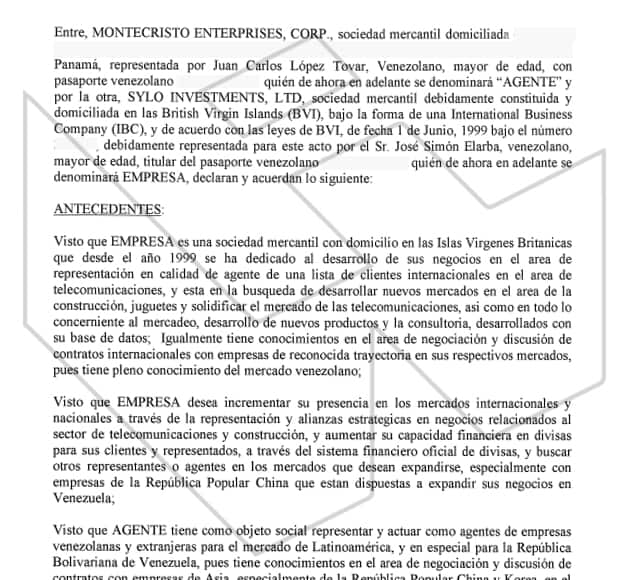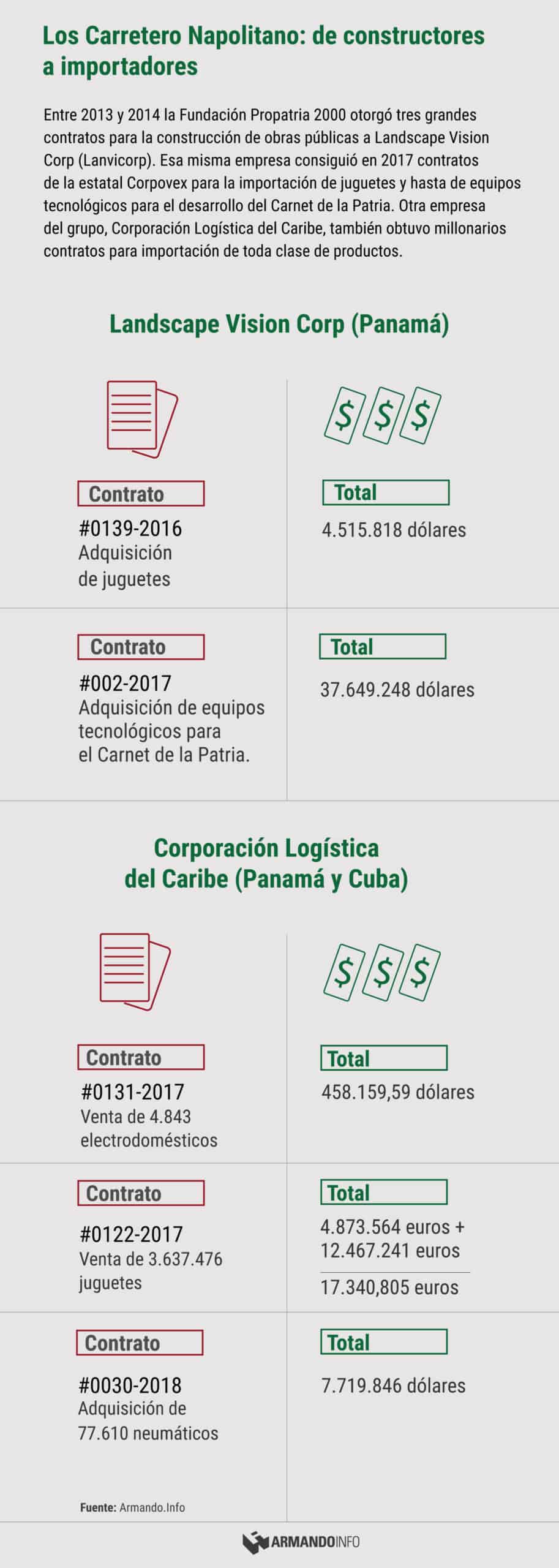The Carnet de la Patria contains a wealth of information about its users. With a simple scan of the QR code it bears, data is quickly transmitted and stored on the servers of the government platform Patria. However, outside of this system, there is also valuable information related to this card: the same Panamanian business group that Nicolás Maduro benefited with significant construction contracts shortly after assuming power in 2013, which employs a partner of Carlos Erick Malpica Flores, nephew of First Lady Cilia Flores, also earned over 37 million dollars with the production of the new document.
On December 29, 2016, Maduro first introduced the idea for this plastic card. With the hook that the new card would serve to deliver bonuses or systematize the registration of social missions, the Chavista regime took another step toward social control of the population after having previously established the distribution of subsidized food through the Local Committees for Supply and Production (CLAP).
Less than a month after that initial announcement, on January 20, 2017, mass registration began at all Bolívar squares across the country. A week prior, on January 13, 2017, without public announcement and in the calm of the offices, Maduro’s administration awarded a contract worth just over 37 million dollars to Landscape Vision Corp (Lanvicorp) for the “acquisition of technological equipment” that would be used by the state-owned telecommunications company Cantv in the development of the card. That first year, according to official spokespeople, up to 15 million people obtained the document.
Nicolás Maduro awarded a contract for just over 37 million dollars to Panamanian entrepreneurs for the importation of technological equipment for the development of the Carnet de la Patria. Credit: Image taken from vtv.gob.ve.
The deal bore the stamp of the Venezuelan Corporation for Foreign Trade (Corpovex), the state agency that centralizes public purchases, under number 0002 of 2017 for the exact amount of 37,649,248 million dollars. However, Lanvicorp is actually a construction company of the Panamanian entrepreneurs Carretero Napolitano, which did not prevent them from being awarded an IT contract from the office of Army General Giuseppe Yoffreda, then president of Corpovex.
This new contract was not hindered by the fact that the projects assigned to Lanvicorp by the Propatria 2000 Foundation between 2013 and 2014 were not even finished, such as the grand stadium project of baseball Hugo Chávez in La Rinconada, in southwest Caracas, which was supposed to be inaugurated in 2015, or later the new date of June 30, 2019, promised by Maduro himself.
“Mark it down! June 30, 2019, we will be here with the people of Caracas and everyone who wants to come and enjoy the inauguration of the most beautiful, modern, and largest baseball stadium in all of Latin America and the Caribbean,” Maduro promised on the eve of his disputed re-election on May 20, 2018. He justified the previous failure to meet deadlines by citing “the drop in oil prices, the economic war, financial persecution, and the seizure of financial resources by the U.S. government against Venezuela.”
Photographs taken at the site this week by Armando.Info confirm that a lot is still needed before the stadium is ready for play. Meanwhile, the same Panamanian contractors, Lanvicorp and the Carretero Napolitano group, continued to engage in multiple contracts with the Venezuelan state.
Because it was not just the Carnet de la Patria: one month prior to that massive allocation, for example, Corpovex had signed another contract with Lanvicorp, identified with number 0139 on December 9, 2016, in which the company received 4.5 million dollars for the “acquisition of toys,” at the request of the Presidency’s Office.
Peddling Contracts
Staying true to its opacity, the Chavista regime has revealed little about the Carnet de la Patria. It is known, at least, that at the end of last year, 21 million people possessed the document.
An investigation by Reuters, published in 2018, uncovered the involvement of the Chinese technology company ZTE in the project “to build a database with the cards and create a mobile payment system for use with the card.” The report detailed that ZTE sold the servers for the database that stores the information of each cardholder, stating that workers from the Chinese company were within a “special unit of Cantv.” There was no indication that the Carretero Napolitano construction company was involved in the project.
The Carretero Napolitano clan is led by brothers Ramón, Vicente, and Roberto. The most well-known family business in Panama is the bicycle distributor Rali, founded decades ago, with which they have been associated with the cycling federation of that country. However, they did not reach Venezuela on bicycles, but with the construction company Lanvicorp, and long after: exactly when Maduro assured the continuity of the self-proclaimed Bolivarian Revolution.
Neither Lanvicorp nor Distribuidora Rali responded to interview requests sent via email by the author of this report.
Like in dozens of companies they have in Panama, the three brothers exchanged roles within Lanvicorp in Venezuela, but ultimately, Ramón Carretero Napolitano, 56 years old, remained in charge. He is also responsible for the subsidiary registered in Hong Kong in 2015. Sources familiar with their activities in Caracas agree that the group entered the country recommended by the Cuban regime, which they have served, and that from the very beginning, Ramón Carretero Napolitano became close to Carlos Malpica Flores, the nephew of the most prominent First Lady in the public administration. There is evidence supporting both narratives.
The Venezuelan branch of Lanvicorp was established in August 2013, seven years after the creation of its holding company of the same name in Panama. Within months, it obtained three major contracts from the Propatria 2000 Foundation: in addition to the unfinished Hugo Chávez baseball stadium, the company was tasked with the “remodeling and refurbishment of the Guaicamacuto and Gran Caribe hotels” in the coastal state of Vargas, as well as the construction of 20 “vertical gyms,” almost simultaneously with a similar contract to build another 30 gyms that was awarded to businessman Alex Saab—now extradited to the United States while awaiting trial—along with his partner, Álvaro Pulido Vargas.
While still “acting president” of the Republic, on April 1, 2013, less than a month after Hugo Chávez’s death, Maduro ordered the Propatria 2000 Foundation to be placed under the control of the Presidency’s Office. Additionally, the contracts from the Propatria 2000 Foundation for Lanvicorp coincide with the period when Carlos Malpica Flores was the main director of the institution—he entered the position in November 2012—and shortly before Walter Jacob Gavidia Flores, Cilia Flores’s son, took over the presidency of the organization.
“At the Foundation [Propatria 2000], it was always said that Lanvicorp was linked to Carlos Malpica, and the Colombians [Alex Saab and Álvaro Pulido] to Walter Gavidia,” reveals a former employee of the Propatria 2000 Foundation.
Carlos Malpica Flores then continued his ascent in public office, eventually reaching the national treasury and the vice-presidency of finance at the state-owned oil company Pdvsa, among the most significant positions, while Ramón Carretero Napolitano continued to accumulate business in Venezuela. “He is smarter than Saab and Pulido,” claims a source who prefers anonymity and also associates the Panamanian businessman with current oil marketing of Pdvsa.
All for One
Another link between Ramón Carretero Napolitano and Carlos Malpica Flores is documented in Panama’s commercial registry. In the companies Grupo Carrelop Corp, Pro Hogares S.A., and Galeras del Este, all registered between January and June 2014—today, the first two are dissolved—Ramón Carretero Napolitano shared business with Juan Carlos López Tovar, a Venezuelan contractor for Pdvsa and associate of Carlos Malpica Flores in the Venezuelan companies Inlasa C.A. and Redilama C.A., according to the National Registry of Contractors (RNC).
The closeness of Carlos Malpica Flores’s partner with Ramón Carretero Napolitano is such that in other companies they have registered in Panama, Juan López Tovar uses as his address the “Rali Carretero Sport building” on José Domingo Díaz Avenue in Panama City.
This is the case of the company Montecristo Enterprises Corp, under which Juan López Tovar signed a commercial agreement in December 2013, according to documents from the Pandora Papers leak, with Sylo Investments Ltd, a British Virgin Islands company owned by businessman José Simón Elarba, who publicly acknowledged his friendship with Carlos Malpica Flores: “He is my dear friend, my close friend,” Elarba told Armando.Info when consulted for another report.
 Juan López Tovar was a partner in Caracas with Carlos Malpica Flores and also engaged in business with José Simón Elarba, the owner of Fospuca and friend of Cilia Flores’s nephew.
Juan López Tovar was a partner in Caracas with Carlos Malpica Flores and also engaged in business with José Simón Elarba, the owner of Fospuca and friend of Cilia Flores’s nephew.
According to the papers, the agreement specifies that Juan López Tovar and his company Montecristo Enterprise Corp have experience in the “telecommunications area, real estate construction, toy manufacturing,” as well as “extensive experience and knowledge in bidding and budget management for handling the necessary foreign currencies to operate businesses in Venezuela through valid and legal mechanisms for obtaining foreign currencies in the national banking market.”
The tie between Carlos Malpica Flores’s partner and Ramón Carretero Napolitano is even deeper, according to some journalistic accounts, such as one published on Infodio.com, which states that Juan López Tovar is the brother-in-law of Carlos Malpica Flores, being married to Iriamni Malpica Flores. Documents reveal payments made in 2013 by Corporación Logística del Caribe, another company of Ramón Carretero Napolitano, to Juan López Tovar and Iriamni Malpica Flores for 178,000 and 78,000 dollars, respectively.
This company, Corporación Logística del Caribe, also obtained contracts from the state-owned Corpovex just months after Lanvicorp sealed the Carnet de la Patria deal, according to documents obtained for this report.
Between 2017 and 2018, the company, also registered in Panama, secured contracts for the sale of 4,843 home appliances, nearly four million toys, and 77,610 tires. In total, the three contracts amount to just over eight million dollars and 17.3 million euros.

With Cuba’s Blessing
This same Corporación Logística del Caribe, registered in Panama in 1995, allows tracing the links of Ramón Carretero Napolitano with the Castro regime in Cuba. In addition to a variety of contracts in Venezuela, the company has a branch in the Cuban capital and is represented by Ramón Carretero Napolitano himself.
In Cuba, the Corporación Logística del Caribe holds a license for foreign merchant companies, allowing it to market a wide range of products, from food such as “meat preparation,” “sugars,” “cocoa and its preparations,” to “pharmaceutical products,” “footwear,” and even “art or collection objects and antiques,” among others.
“Ramón Carretero knows Maduro and Cilia [Flores] through Raúl Castro. In Cuba, he also did constructions and moves between Caracas and Havana,” insists one of the sources consulted.
Although he seeks a low profile, late last year he was seen with the retired admiral and current mayor of Caracas, Carmen Meléndez, during a new inspection of authorities at the Hugo Chávez baseball stadium. “We continue to advance in the construction of the Hugo Chávez baseball stadium in La Rinconada,” he tweeted on November 30, 2021, without committing to a possible inauguration date.
Unlike their fate in Venezuela, in Panama, both Ramón Carretero Napolitano and his brother Roberto have been investigated by authorities and punished for irregularities in public contracting during Ricardo Martinelli’s administration.
For example, last December, Roberto Carretero Napolitano and the former head of the National Aid Program (PAN) were sentenced to four years in prison for the crime of embezzlement. “The proven crime was committed through the irregular acquisition of musical instruments intended for the Ministry of Education through the PAN,” reported the Panamanian Public Ministry.
In 2015, Ramón Carretero Napolitano himself had to appear before the Anti-Corruption Prosecutor’s Office to provide statements regarding alleged irregularities in awarding contracts for the purchase and sale of food bags through PAN funds.
But in Venezuela, meanwhile, Ramón Carretero Napolitano was gaining influence in Nicolás Maduro’s government.
